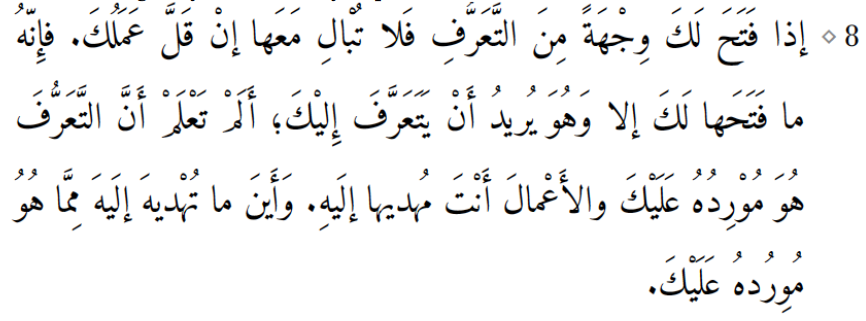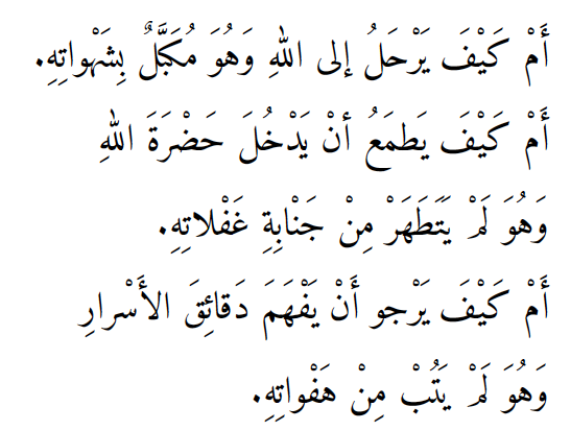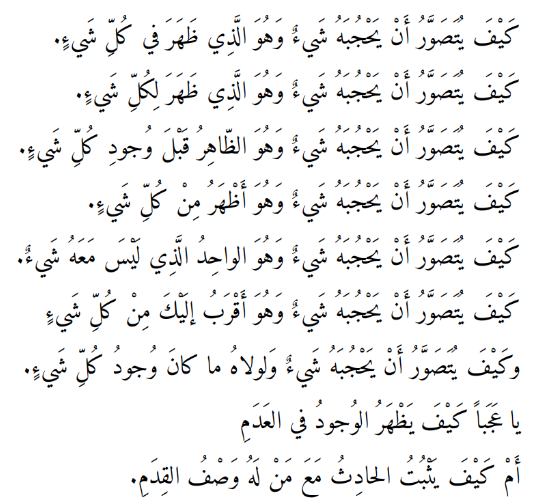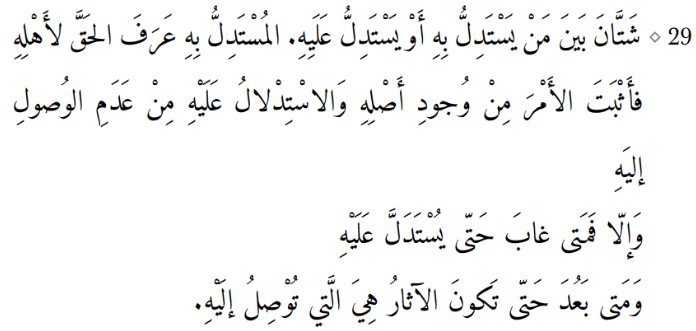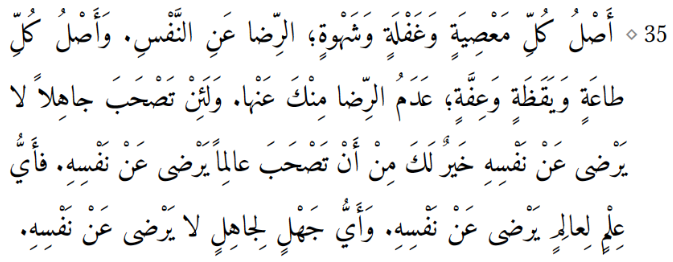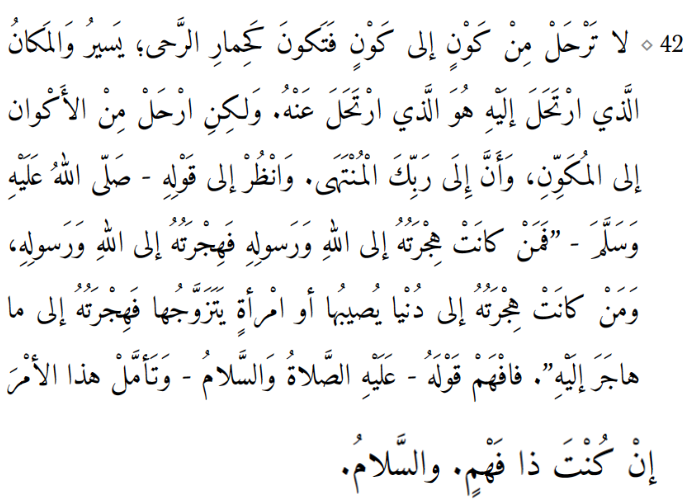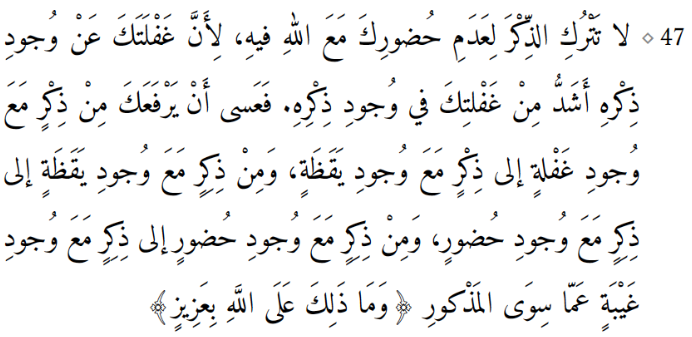Fasting in Ramaḍān
According to the maddhab of Imam Mālik, from the Risalah of Ibn Abi Zayd al-Qayrawani (d. 386 AH/996 CE), translated by Shaykh Hamza Wald Maqbul.
via www.themadinanway.com
وَصَوْمُ شَهْرِ رَمَضَانَ فَرِيضَةٌ
The fast of the month of Ramadhan is an obligation.
يُصَامُ لِرُؤْيَةِ الْهِلَالِ وَيُفْطَرُ لِرُؤْيَتِهِ كَانَ ثَلَاثِينَ يَوْمًا أَوْ تِسْعَةً وَعِشْرِينَ يَوْمًا
فَإِنْ غُمَّ الْهِلَالُ فَيُعَدُّ ثَلَاثِينَ يَوْمًا مِنْ غُرَّةِ الشَّهْرِ الَّذِي قَبْلَهُ ثُمَّ يُصَامُ وَكَذَلِكَ فِي الْفِطْرِ
If the sighting of the new moon is obscured by low visibility, let the previous month last for thirty
days, then fast the next day. Reckon the month of opening the fast be reckoned likewise.
وَيُبَيِّتُ الصِّيَامَ فِي أَوَّلِهِ وَلَيْسَ عَلَيْهِ الْبَيَاتُ فِي بَقِيَّتِهِ , وَيُتِمُّ الصِّيَامَ إلَى اللَّيْلِ
Let the one fasting make the intention to fast in the night before its commencement. It is not necessary to make the intention again thereafter [2]. Fasting is to be completed until the entering of night [3].
وَمِنْ السُّنَّةِ تَعْجِيلُ الْفِطْرِ وَتَأْخِيرُ السُّحُورِ وَإِنْ شَكَّ فِي الْفَجْرِفَلَا يَأْكُلْ
It is from the Sunnah to expedite the opening of the fast at its end. It is also such to delay the pre-dawn meal until near dawn, however if there is some doubt as to the exact time of the impending dawn, one should not eat.
وَلَا يُصَامُ يَوْمُ الشَّكِّ لِيَحْتَاطَ بِهِ مِنْ رَمَضَانَ وَمَنْ صَامَهُ كَذَلِكَ لَمْ يُجْزِهِ وَإِنْ وَافَقَهُ مِنْ رَمَضَانَ وَلِمَنْ شَاءَ صَوْمَهُ تَطَوُّعًا أَنْيَفْعَلَ
A day of doubt [as to whether or not Ramadhan has entered] is not to be fasted out of being cautious due to the possibility of its being part of Ramadhan [4]. Whoever fasts it [i.e. the day of doubt], it does not count for him and even if it later becomes apparent that such a day was, in fact, one of the days of Ramadhan. However, whoever wishes to fast such a day as a general act of obedience [and not with the intention of fasting a day of Ramadhan or out of caution due to the possibility of that day being part of it], it is allowed.
If a person wakes up and has not eaten or drunk anything, then it becomes apparent to him that it is a day of Ramadhan, it [i.e. his abstention from the things that break the fast] do not suffice him [in making that a validly fulfilled fast day]. However, he must [by obligation] abstain from all thing which break the fast for the rest of the day, then make up that fast day [after Ramadhan].
If a traveler should arrive at the [end] destination of his travel, or the menses of a woman should end, during the day, it is permissible for them to eat for the rest of that day.
وَمَنْ أَصْبَحَ فَلَمْ يَأْكُلْ وَلَمْ يَشْرَبْ ثُمَّ تَبَيَّنَ لَهُ أَنَّ ذَلِكَ الْيَوْمَ مِنْ رَمَضَانَ لَمْ يُجْزِهِ وَلْيُمْسِكْ عَنْ الْأَكْلِ فِي بَقِيَّتِهِ وَيَقْضِيهِ
وَإِذَا قَدِمَ الْمُسَافِرُ مُفْطِرًا أَوْ طَهُرَتْ الْحَائِضُ نَهَارًا فَلَهُمَا الْأَكْلُفِي بَقِيَّةِ يَوْمِهِمَا
If a traveler should arrive at the [end] destination of his travel, or the menses of a woman should end, during the day, it is permissible for them to eat for the rest of that day.
وَمَنْ أَفْطَرَ فِي تَطَوُّعِهِ عَامِدًا أَوْ سَافَرَ فِيهِ فَأَفْطَرَ لِسَفَرِهِ فَعَلَيْهِ الْقَضَاءُ وَإِنْ أَفْطَرَ سَاهِيًا فَلَا قَضَاءَ عَلَيْهِ بِخِلَافِ الْفَرِيضَةِ
وَلَا بَأْسَ بِالسِّوَاكِ لِلصَّائِمِ فِي جَمِيعِ نَهَارِهِ
There is no harm in one fasting using a tooth-stick at any time of the day.
وَلَا تُكْرَهُ لَهُ الْحِجَامَةُ إلَّا خِيفَةَ التَّغْرِيرِ
It is not offensive for one who is fasting to practice cupping [during his fast], except if it should cause him to be weak.
وَمَنْ ذَرَعَهُ الْقَيْءُ فِي رَمَضَانَ فَلَا قَضَاءَ عَلَيْهِ وَإِنْ اسْتَقَاءَ فَقَاءَ فَعَلَيْهِ الْقَضَاءُ
If one should vomit [while fasting] while in Ramadhan, he does not have to make up that fast day [and it is valid]. However, should one induce vomiting intentionally, then vomits, he must make up that fast day.
وَإِذَا خَافَتْ الْحَامِلُ عَلَى مَا فِي بَطْنِهَا أَفْطَرَتْ وَلَمْ تُطْعِمْ وَقِيلَ تُطْعِمُ وَلِلْمُرْضِعِ إنْ خَافَتْ عَلَى وَلَدِهَا وَلَمْ تَجِدْ مَنْ تَسْتَأْجِرُهُ لَهُ أَوْ لَمْ يَقْبَلْ غَيْرَهَا أَنْ تُفْطِرَ وَتُطْعِمَ
Should a pregnant woman fear for that which is in her womb [...]. Should a nursing-mother fear for her suckling child, and she is not able to find anyone who she can hire to nurse her child or the child does not accept the milk of anyone but its mother, she should break her fast and eat. [and make up that fast day later].
وَيُسْتَحَبُّ لِلشَّيْخِ الْكَبِيرِ إذَا أَفْطَرَ أَنْ يُطْعِمَ وَالْإِطْعَامُ فِي هَذَا كُلِّهِ مُدٌّ عَنْ كُلِّ يَوْمٍ يَقْضِيهِ
It is recommended that a person of advanced age [or anyone of a chronic excuse and is not expected to recover from it], should that person break a fast, feed [a needy Muslim] a mudd [5] for each day he is expected to make up.
وَكَذَلِكَ يُطْعِمُ مَنْ فَرَّطَ فِي قَضَاءِ رَمَضَانَ حَتَّى دَخَلَ عَلَيْهِ رَمَضَانُ آخَرُ
Likewise one who neglected their due makeup fasts until the next Ramadhan is expected to feed [a needy Muslim one mudd for each fast day makeup neglected for such a long period].
وَلَا صِيَامَ عَلَى الصِّبْيَانِ حَتَّى يَحْتَلِمَ الْغُلَامُ وَتَحِيضَ الْجَارِيَةُ وَبِالْبُلُوغِ لَزِمَتْهُمْ أَعْمَالُ الْأَبْدَانِ فَرِيضَةً
Children are not required to fast; it is thus for a young boy until he has his first nocturnal seminal emission and for a young girl until she has her first menstrual period. It is with physical maturity that the religious duties incumbent upon the body are made obligatory.
قَالَ اللَّهُ سُبْحَانَهُ وَتَعَالَى { وَإِذَا بَلَغَ الْأَطْفَالُ مِنْكُمْ الْحُلُمَفَلْيَسْتَأْذِنُواْ}
Allāh, glory to Him, Most High, said: {When children should reach physical maturity..} (Qurʾān 24:59)
وَمَنْ أَصْبَحَ جُنُبًا وَلَمْ يَتَطَهَّرْ أَوْ امْرَأَةٌ حَائِضٌ طَهُرَتْ قَبْلَ الْفَجْرِ فَلَمْ يَغْتَسِلَا إلَّا بَعْدَ الْفَجْرِ أَجْزَأَهُمَا صَوْمُ ذَلِكَ الْيَوْمِ
If one should wake up in a state of major impurity [janabah, i.e. one which requires a ritual purificatory bath (ghusl)], or a woman’s menses should end in the night before the arrival of true dawn, and such a person did not take a ritual purificatory bath until after the true dawn, that day’s fast is still sufficient.
وَلَا يَجُوزُ صِيَامُ يَوْمِ الْفِطْرِ وَلَا يَوْمُ النَّحْرِ
It is unlawful to fast on the Festival of Fast-opening [Eid al-Fitr] [6], or the Festival of Sacrifice [Eid al-Adhha or al-Nahr] [7].
وَلَا يَصُومُ الْيَوْمَيْنِ اللَّذَيْنِ بَعْدَ يَوْمِ النَّحْرِ إلَّا الْمُتَمَتِّعُ الَّذِي لَا يَجِدُ هَدْيًا وَالْيَوْمُ الرَّابِعُ لَا يَصُومُهُ مُتَطَوِّعٌ
وَيَصُومُهُ مَنْ نَذَرَهُ أَوْ مَنْ كَانَ فِي صِيَامٍ مُتَتَابِعٍ قَبْلَ ذَلِكَ
However one who vowed to fast it, or is observing a necessarily consecutive fast from the time before it, must fast it.
وَمَنْ أَفْطَرَ فِي نَهَارِ رَمَضَانَ نَاسِيًا فَعَلَيْهِ الْقَضَاءُ فَقَطْ
Whoever should break their fast on a day of Ramadhan through forgetfulness is only required to make such a day up [as opposed to being required to make the day up as well as make a total expiation for breaking it intentionally] [8].
وَكَذَلِكَ مَنْ أَفْطَرَ فِيهِ لِضَرُورَةٍ مِنْ مَرَضٍ وَمَنْ سَافَرَ سَفَرًا تُقْصَرُ فِيهِ الصَّلَاةُ فَلَهُ أَنْ يُفْطِرَ وَإِنْ لَمْ تَنَلْهُ ضَرُورَةٌ وَعَلَيْهِ الْقَضَاءُ
Likewise, one who [intentionally] breaks his fast out of necessity due to illness. Whoever should [begin a] journey in which he is expected to shorten his prayers [9] is allowed to break his fast, even if he is not forced to by necessity, and such a person must make that day up.
وَالصَّوْمُ أَحَبُّ إلَيْنَا
We prefer that such a person [upon whom the difficulty of travel does not present a need to break the fast,] fast.
وَمَنْ سَافَرَ أَقَلَّ مِنْ أَرْبَعَةِ بُرُدٍ فَظَنَّ أَنَّ الْفِطْرَ مُبَاحٌ لَهُ فَأَفْطَرَ فَلَا كَفَّارَةَ عَلَيْهِ وَعَلَيْهِ الْقَضَاءُ وَكُلُّ مَنْ أَفْطَرَ مُتَأَوِّلًا فَلَا كَفَّارَةَ عَلَيْهِ
Should a person travel less than four burud, and thinking that it is permissible to do so, breaks his fast, it is not necessary for him to perform the complete expiation; rather he must simply make up that fast day. Whoever should [mistakenly] open their fast early, such a person is not obligated to make the complete expiation [either, rather they must simply make up that fast day also].
وَإِنَّمَا الْكَفَّارَةُ عَلَى مَنْ أَفْطَرَ مُتَعَمِّدًا بِأَكْلٍ أَوْ شُرْبٍ أَوْ جِمَاعٍ مَعَالْقَضَاءِ
Indeed, the complete expiation is not incumbent upon anyone, except one who breaks his fast intentionally through eating, drinking or sexual relations. [In addition to the expiation, in such a case,] also incumbent is a makeup of that fast day.
وَالْكَفَّارَةُ فِي ذَلِكَ إطْعَامُ سِتِّينَ مِسْكِينًا لِكُلِّ مِسْكِينٍ مُدٌّ بِمُدِّ النَّبِيِّ صَلَّى اللَّهُ عَلَيْهِ وَسَلَّمَ فَذَلِكَ أَحَبُّ إلَيْنَا
The complete expiation in such a case is [either one of three options]: to feed sixty unfortunate [free [10] Muslims], which [is the option] we prefer.
وَلَهُ أَنْ يُكَفِّرَ بِعِتْقِ رَقَبَةٍ أَوْ صِيَامِ شَهْرَيْنِ مُتَتَابِعَيْنِ
Or he can also expiate by freeing a slave, or by fasting for two months, consecutively.
وَلَيْسَ عَلَى مَنْ أَفْطَرَ فِي قَضَاءِ رَمَضَانَ مُتَعَمِّدًا كَفَّارَةٌ
One who should intentionally break a makeup fast day [performed as a make up] for Ramadhan is not obliged to perform the expiation.
وَمَنْ أُغْمِيَ عَلَيْهِ لَيْلًا فَأَفَاقَ بَعْدَ طُلُوعِ الْفَجْرِ فَعَلَيْهِ قَضَاءُ الصَّوْمِ وَلَا يَقْضِي مِنْ الصَّلَوَاتِ إلَّا مَا أَفَاقَ فِي وَقْتِهِ
One who should be unconscious in the night and does not come back to his senses until after the ascent of true dawn, must make up that fast day, but he is not obliged to make up any of the prayers he missed, except the one…
وَيَنْبَغِي لِلصَّائِمِ أَنْ يَحْفَظَ لِسَانَهُ وَجَوَارِحَهُ
It is becoming of one who is fasting to guard his tongue [, heart] and limbs [from all things which displease the Creator, glory to Him, Most High],
وَيُعَظِّمَ مِنْ شَهْرِ رَمَضَانَ مَا عَظَّمَ اللَّهُ سُبْحَانَهُ وَتَعَالَى
and that he should magnify those things in Ramadhan which Allāh, glory to Him, Most High, magnified.
Footnotes
Footnotes
[1] It is important to note that although Islam is, like the erudite Hafidh Iftikhar Shafi mentioned, never in conflict with reality. That being said, it is one of fixed the rituals of Islam, that each locality not begin the fast of Ramadhan nor end it, except through the sighting of the first visible sliver of the new moon of the months of Ramadhan and Shawwal respectively. This position of Ikhtilaf al-Mutali’ is the relied upon position of the Maliki school as reported to me by the righteous Shaykh Muhammad bin Muhammad al-Amin bin ‘Abd al-Rahman bin al-Shaykh bin Fahfu, may Allāh have mercy on them, and sanctify their that which their innermost souls carried in the way of righteousness. The alternative which has found much acceptance in the minds of the Muslims of Ittihad al-Matali’ or the global moon sighting fails to take into account the fact that the visibility curve of the moon from earth actually allows for the sighting to be visible on the same night from some places and not others. Of course, none of the Sahabah, may Allāh be well pleased with them were privy to this technical detail, nevertheless it comes in Sahih Muslim:
Kuraib reported that Umm Fadl, daughter of Harith, sent him (Fadl, i. e. her son) to Muʿāwiyah in Syria. I (Fadl) arrived in Syria, and did the needful for her. It was there in Syria that the month of Ramadhan commenced. I saw the new moon (of Ramadhan) on Friday. I then came back to Medina at the end of the month. Abdullah b. 'Abbas (may Allāh be pleased with him) asked me (about the new moon of Ramadan) and said: When did you see it? I said: We saw it on the night of Friday. He said: (Did) you see it yourself? I said: Yes, and the people also saw it and they observed fast and Muʿāwiyah also observed fast, whereupon he said: But we saw it on Saturday night. So we would continue to observe fast till we complete thirty (lasts) or we see it (the new moon of Shawwal). I said: Is the sighting of the moon by Muʿāwiyah not valid for you? He said: No; this is how the Messenger of Allāh ﷺ has commanded us.
[2] It is important to note that if for some reason the continuous chain of fast days is broken for a lawful reason such as illness or travel or an unlawful reason such as intentional breaking of the fast or failure to even make the intention to fast on an obligatory fast day, that this initial intention which suffices the slave for the rest of the days of Ramadhan must be made again, and it will thenceforth be valid for him until the end of the month. It is recommended that one make intention to fast every night of Ramadhan before the dawn on the fast day intended.
[3] Sunset.
[4] Neither is it lawful, nor is the fast valid if performed in such conditions.
[5] A mudd is the amount that fills up two hands cupped together. The mudd referred to here is that of the Messenger of Allāh ﷺ, which Shaykh Nuh Keller estimates in his Reliance of the Traveller to be 0.51 litres.
[6] Shawwal 1.
[7] Dhul-Hijjah 10.
[8] This is to me [Hamza Wald Maqbul] - not that my opinion in the matter is worth anything - the biggest difference of opinion between the Malikis and their brothers from the Hanafi and Shafi’i madhabs.
Abu Huraira narrated: the Prophet ﷺ said, "If somebody eats something forgetfully while he is fasting, then he should complete his fast, for Allah has made him eat and drink." [Sahih Bukhari Volume 8, Book 78, Number 662]
When I took this ruling from my beloved Shaykh Muhammad, may Allāh perpetuate his barakah amongst us and give him the patience to suffer many more years of teaching me, I immediately mentioned this hadith. He calmly countered that though this hadith proves that there is no sin upon the one who forgetfully should eat or drink during the fast; it says nothing about the validity of the fast nor the necessity or lack thereof of making such a fast day up.
[9] A journey of 48 miles or more.
[10] As the feeding of a slave is not a charity because it is already a duty that the slave’s master is obliged to perform.






